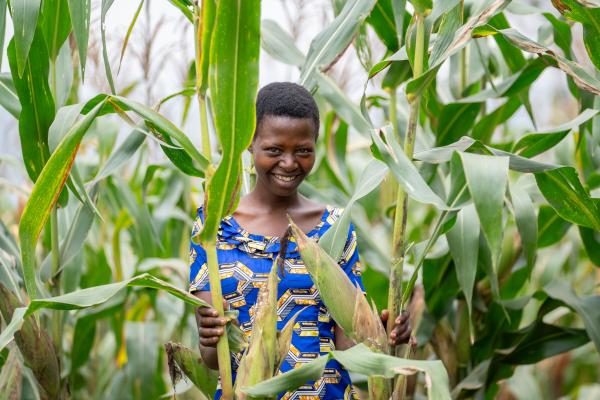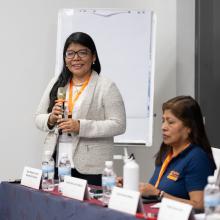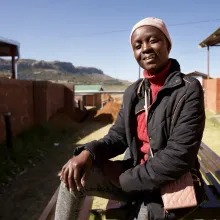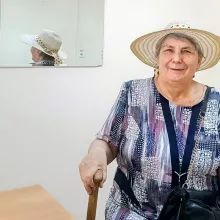Mental health care remains at the margins of global health delivery: nine in ten people worldwide receive no care for treatable mental health conditions. Partners In Health (PIH) works to expand mental health care from institutional treatment to community systems, meeting people where they live to help address this need.
PIH’s Cross-Site Mental Health Program seeks to improve the lives of patients and communities by expanding the continuum of mental health and psychosocial support services across all 11 PIH care delivery sites globally.
Learn more about these services by getting to know six of PIH’s Mental Health Program leaders around the world:
Junior Brice, MD, MPH – Zanmi Lasante Mental Health Director
When Dr. Brice was working in the HIV program at Zanmi Lasante (ZL), PIH’s sister organization in Haiti, he collaborated with psychologists to provide clinical evaluations to patients. There, he was amazed by their approach to understanding how psychosocial factors impact overall health. Seeing the importance of integrating mental health work into patient care helped guide his work for ZL’s Mental Health Program.
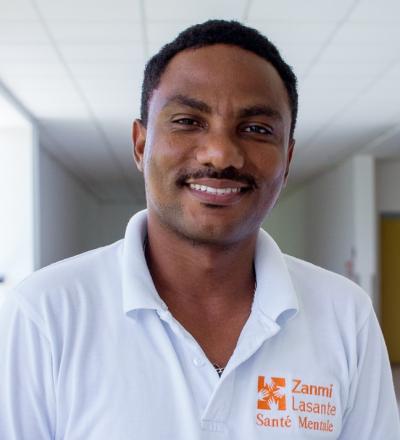
“I want to help transform how mental health is understood, valued, and integrated into everyday life in Haiti, break the stigma surrounding mental illness, and make mental health care accessible, community-based, and culturally relevant,” Dr. Brice shared.
At ZL, he has helped ensure mental health services are a key component of primary health care and brought the program directly into communities by training general clinicians and community health workers to provide consistent support and reduce stigma.
“[ZL] has an integrated model in treating mental illness together with the social and economic problems that typically propel it,” he said. “It is a model respectful of local culture and addresses mental health as both a medical and a social issue. The level of care provided by PIH—integrated, consistent, and community-based—simply doesn’t exist elsewhere at that scale in rural Haiti.”
Dr. Brice is proud to work for a program that is so deeply rooted in the communities it serves. He believes it makes treatment more humane, consistent, and trustworthy.
“In Haiti, where mental health is stigmatized and neglected, every single person who receives care and finds hope is a victory,” Brice said. “The PIH and ZL approach to mental health shows that when people are treated as a whole and when communities are involved in the treatment process, we can achieve sustainable results and build an equitable health system.”
⎯
Carmen Contreras, MSc - Socios En Salud Mental Health Program Director
After over two decades of working on various research and initiatives for Socios En Salud (SES), as PIH is known in Peru, Contreras took on leading the mental health team eight years ago. She developed mental health intervention strategies with guidance from other mental health leaders within PIH and from the implementation of various initiatives across other PIH sites.
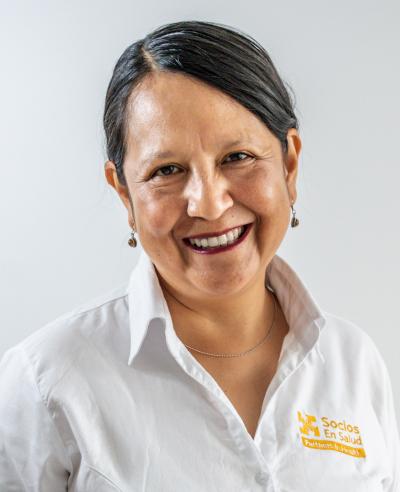
“We have a superb Mental Health Cross-Site team, with whom we strengthen each other,” Contreras said. “We’ve learned that, together, we are stronger than apart. Our meetings, sometimes remote and sometimes in person, have allowed us to learn new interventions and continue growing as a team.”
For Contreras, community has a significant impact on PIH’s approach to mental health care—both between colleagues and with the patients they serve.
“Community work makes a difference,” she said. “Through community support, we help people with mental health problems approach health centres with greater confidence, enabling communities to connect with services, and in return, both are strengthened: the community feels more heard, and mental health services become more humane and accessible.”
Contreras finds her purpose in seeing these transformations. Seeing the changes, hearing patients’ stories, and feeling their trust reminds her why she remains committed to this work.
“Every word of gratitude we receive—whether from a health professional at a Community Mental Health Centre or a representative from the Ministry of Health—is a sign that we’re on the right path,” Contreras said.
⎯
Chenjezo Gonani, BSc, MMSc – PIH Sierra Leone Mental Health Program Manager
When Gonani was growing up, he saw his best friend experience a mental health crisis that was followed by extreme stigma and abuse. This childhood memory stuck with him as he was practicing as a general clinician in rural districts of Malawi and noticed families in need of mental health care that was inaccessible to them. He now works to make sure no one has to suffer due to a lack of resources.

“PIH’s approach to mental health is very unique because we build functional mental health care delivery systems along the continuum of care, ensuring that there are services to treat and rehabilitate people in severe mental distress, as well as those who are experiencing mild to moderate distress,” Gonani explained.
This approach has helped transform mental health care for people in Sierra Leone, where Gonani works.
“Before PIH’s involvement, access to mental health care was almost nonexistent in the country,” he said. “For example, the few patients that were at Kissy Home—the oldest psychiatric hospital in sub-Saharan Africa and now, with the support of PIH, transformed into Sierra Leone Psychiatry Teaching Hospital—were left in chains because of a lack of mental health medication and providers to effectively provide care, and no services were available in the outskirts of the country.”
The changes Gonani has seen from PIH’s bold, innovative, and compassionate approach has brought him great joy and hope. PIH Sierra Leone helped establish the first specialized child and adolescent mental health unit, the first psychiatry residency program in the country, the first national toll-free mental health helpline, and the first specialized drug treatment and rehabilitation services.
“I am motivated by seeing the impact of our initiatives that have given hope to so many people who, for years, have been struggling with mental illness and are now getting back to their normal selves and functioning well in the community,” Gonani said.
⎯
Helen Tedros Haile, MD – PIH Liberia Mental Health Program Manager
As a psychiatrist, Dr. Haile often notices the immense gap that exists in accessing mental health care, especially in rural and underserved communities. When she joined PIH Liberia, she turned her passion into action through care delivery, support, and community-based interventions.
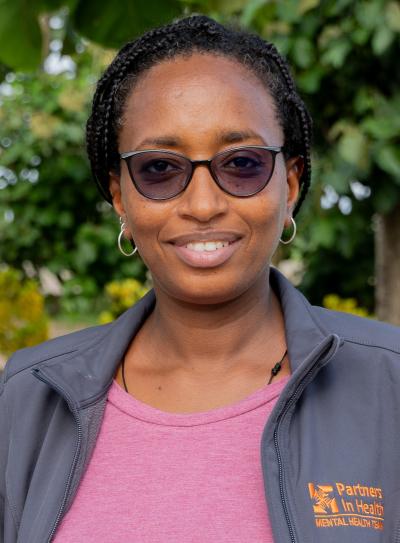
“PIH’s approach is rooted in the belief that mental health care is a human right and should be integrated into the broader health system,” Dr. Haile shared. “It’s not just about medication or diagnosis, it’s about dignity, equity, and long-term recovery.”
Haile shared that many mental health services in Liberia area concentrated in urban areas, but sill with very few trained professionals and little community outreach. She is grateful for the care PIH Liberia provides communities that are often neglected by health systems.
“Without PIH, access would be extremely limited in southeast Liberia,” she said. “Patients in rural settings would face long travel distances, high costs, and significant stigma. They would likely not receive the same quality, continuity, or compassionate care that PIH provides, including the follow-ups, family engagement, psychosocial support, and skill-building opportunities we offer.”
Haile has been amazed to witness how PIH Libera’s work has transformed lives and communities.
“My favorite part of my work is watching people recover and reclaim their lives. Every life we touch, every patient we accompany toward healing, reinforces the value of this work,” she said. “Knowing that we are changing the narrative around mental health in Liberia keeps me going.”
⎯
Augustin Mulindabigwi, MPH – Inshuti Mu Buzima Mental Health Program Director
Mulindabigwi saw a need in local communities that were affected by mental illness. He witnessed how, when left untreated, symptoms could impact every aspect of life. After studying clinical psychology, he joined Inshuti Mu Buzima (IMB), as PIH is known in Rwanda, in 2022 to lead their mental health program.
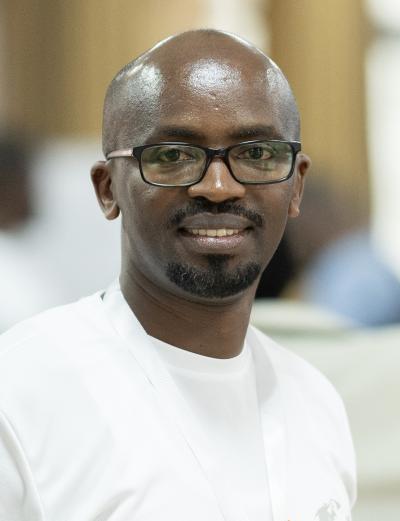
“I believe one of the most impactful aspects of our work is our commitment to system strengthening,” he said. “We do not just provide services—we invest in training, infrastructure, data systems, and advocacy to ensure mental health is sustainably integrated into the broader health system, specifically into chronic care service delivery.”
This work has been life-changing for many of IMB’s patients and people all around Rwanda.
“IMB’s involvement in mental health care has significantly supported the government’s efforts to decentralize and integrate mental health care into primary health care settings,” Mulindabigwi said. “Our work has brought services closer to communities, trained local providers, and integrated mental health into primary care—making care more available, holistic, and person-centred.”
The human-centric approach is very important to Mulindabigwi. He strives to build trust and foster healing, even beyond clinic walls.
“Our approach values the treatment of people more than their diseases and focuses on addressing social determinants of health,” he shared. “Mental health work can be tough, but witnessing resilience in the face of adversity is incredibly powerful and humbling.”
⎯
Ana Cecilia Ortega, MSc – Compañeros En Salud Mental Health Coordinator
During her undergraduate psychology studies, Ortega felt frustrated by the mostly clinical and individualistic focus, and longed to integrate community and social support into her work. When she joined Compañeros En Salud (CES), as PIH is known in Mexico, there was only one dedicated staff member in the mental health program. Now, the program has grown to 13 members, consisting of psychologists, a psychiatrist, and most importantly to Ortega: community mental health workers.
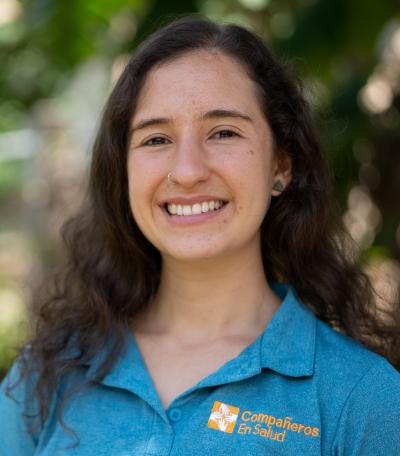
“Nowhere else in Mexico, that I know of, will you find a model like this of employed and consistently supervised and supported Community Mental Health Workers,” she said. “We are constantly co-creating projects with the Community Mental Health Workers and asking for feedback from community members every time we facilitate a new intervention.”
The Community Mental Health Workers are vital to bringing mental health care directly to the communities who need them most.
“Without the services CES provides, people would have to travel for four to six hours at least to reach the closest psychologist or physiatrist,” Ortega said. “At CES, Community Mental Health Workers, teleconsultations, and group interventions help people receive individual mental health care within their communities.”
Ortega finds inspiration in this specialized, community-focused approach.
“The Community Mental Health Workers have been my greatest mentors throughout these years,” she said. “Seeing their incredible work that they tailor to the needs of their communities, how they organize as a team, and being able to support and accompany their struggles and achievements.”
